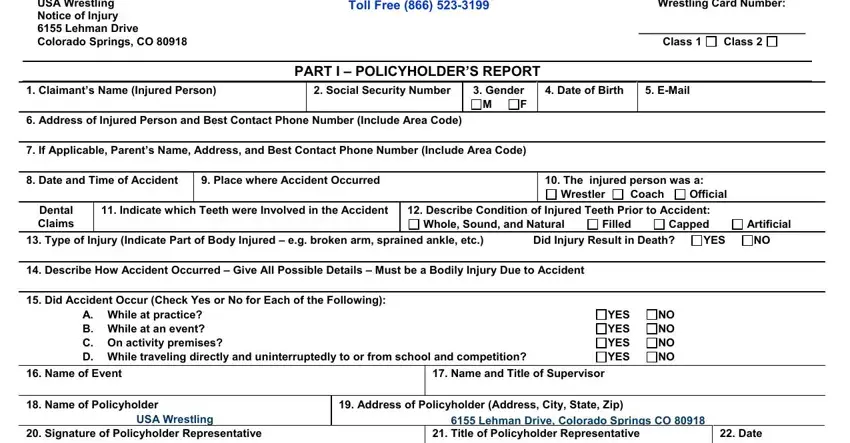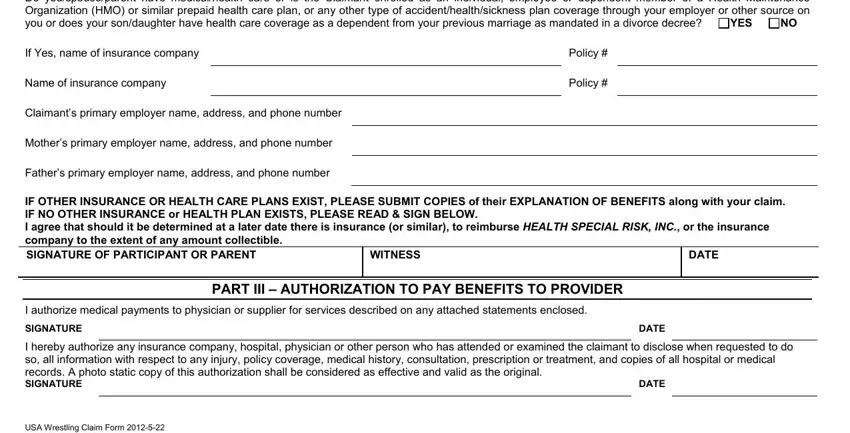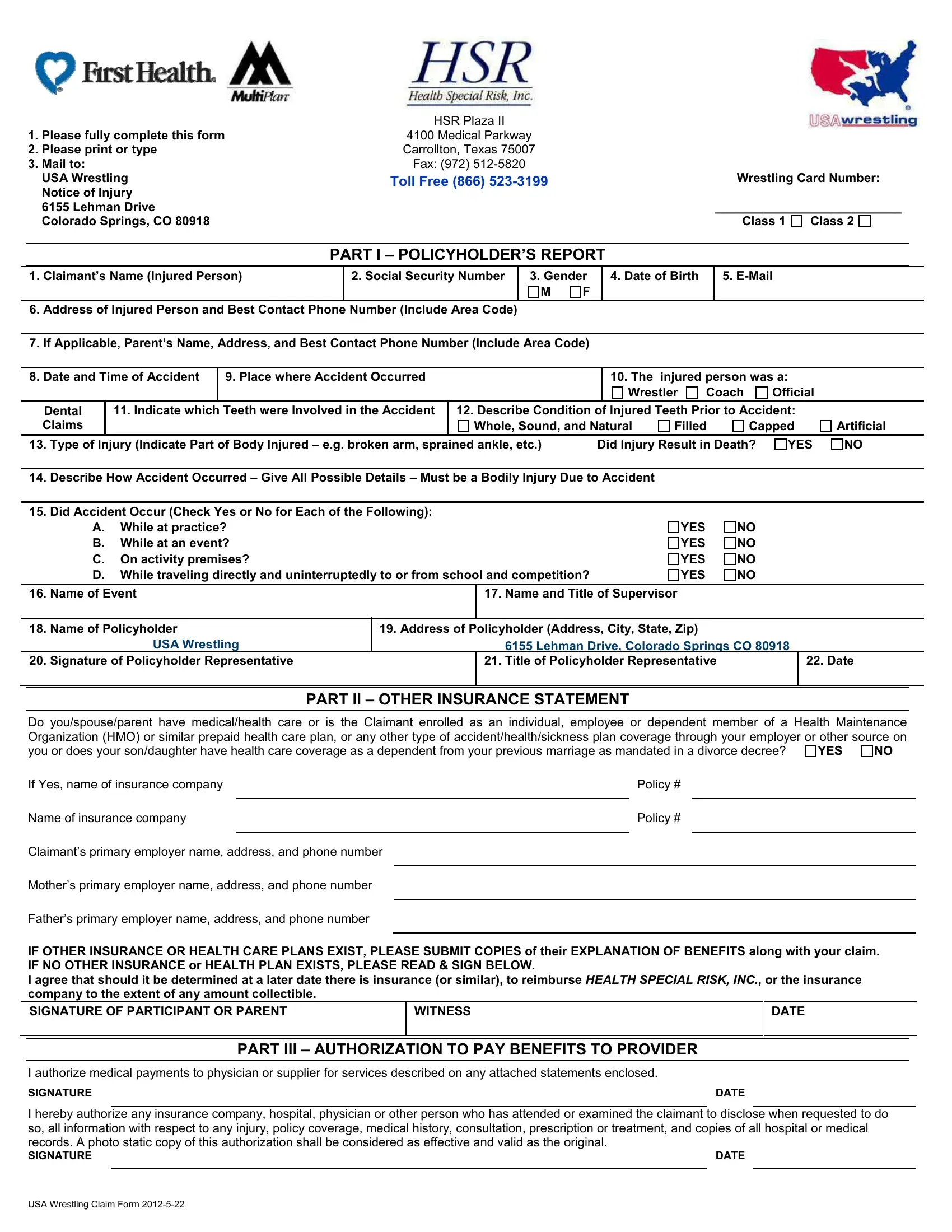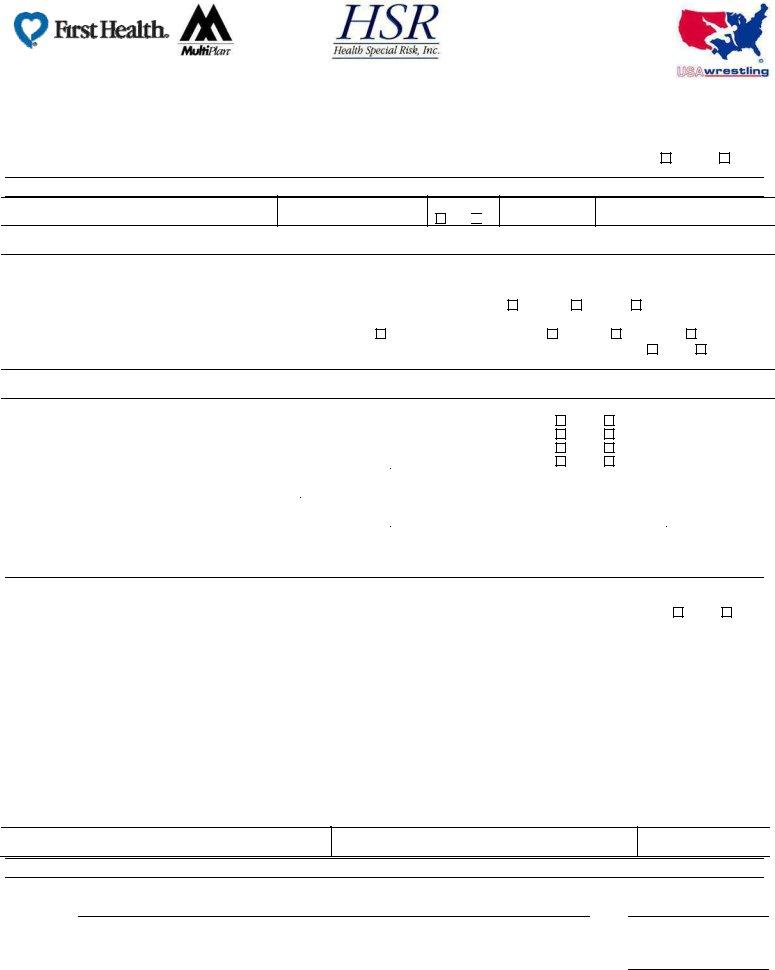FRAUD STATEMENTS
FOR RESIDENTS OF ALL STATES OTHER THAN THOSE LISTED BELOW:
Any person who knowingly presents a false or fraudulent claim for payment of a loss or benefit or knowingly presents false information in an application for insurance is guilty of a crime and may be subject to fines and confinement in prison.
Alaska and Kentuky: Any person who knowingly and with intent to defraud any insurance company or other person files a statement of claim containing any materially false, incomplete or misleading information or conceals, for the purpose of misleading, information concerning any fact material thereto commits a fraudulent insurance act, which is a crime and may be prosecuted under state law.
Arizona: For your protection Arizona law requires the following statement to appear on this form. Any person who knowingly presents a false or fraudulent claim for payment of a loss is subject to criminal and civil penalties.
Arkansas, Louisiana, Maryland, West Virginia: Any person who knowingly presents a false or fraudulent claim for payment of a loss or benefit or knowingly presents false information in an application for insurance is guilty of a crime and may be subject to fines and confinement in prison.
California: For your protection California law requires the following to appear on this form: Any person who knowingly presents a false or fraudulent claim for the payment of a loss is guilty of a crime and may be subject to fines and confinement in state prison.
Colorado: It is unlawful to knowingly provide false, incomplete, or misleading facts or information to an insurance company for the purpose of defrauding or attempting to defraud the company. Penalties may include imprisonment, fines, denial of insurance, and civil damages. Any insurance company or agent of an insurance company who knowingly provides false, incomplete, or misleading facts or information to a policyholder or claimant for the purpose of defrauding or attempting to defraud the policyholder or claimant with regard to a settlement or award payable from insurance proceeds shall be reported to the Colorado division of insurance within the department of regulatory agencies.
Connecticut: This form must be completed in its entirety. Any person who intentionally misrepresents or intentionally fails to disclose any material fact related to a claimed injury may be guilty of a felony.
Delaware, Idaho, Indiana: Any person who knowingly, and with intent to injure, defraud, or deceive any insurer, files a statement of claim containing any false, incomplete or misleading information is guilty of a felony.
District of Columbia: Warning: It is a crime to provide false or misleading information to an insurer for the purpose of defrauding the insurer or any other person. Penalties include imprisonment and/or fines. In addition, an insurer may deny insurance benefits if false information materially related to a claim was provided by the applicant.
Florida: WARNING :Any person who knowingly and with intent to injure, defraud, or deceive any insurer files a statement of claim or an application containing any false, incomplete, or misleading information is guilty of a felony of the third degree.
Hawaii: For your protection, Hawaii law requires you to be informed that presenting a fraudulent claim for payment of a loss or benefit is a crime punishable by fines or imprisonment, or both.
Georgia: Any natural person who knowingly or willfully
1)Makes or aids in the making of any false or fraudulent statement or representation of any material fact or thing:
a)In any written statement;
b)In the filing of a claim; or
c)In the receiving of money for an application for a policy of insurance for the purpose of procuring or attempting to procure the payment of any false or fraudulent claim or other benefit by an insurer;
2)Receives money for the purpose of purchasing insurance and converts such money to such persons own benefit;
3)Issues fake or counterfeit insurance policies, certificates of insurance, insurance identification cards, or insurance binders; or
4)Makes any false or fraudulent representation as to the death or disability of a policy or certificate holder in any written statement for the purpose of fraudulently obtaining money or benefit from an insurer commits the crime of insurance fraud.
Maine: It is a crime to knowingly provide false, incomplete or misleading information to an insurance company for the purpose of defrauding the company. Penalties may include imprisonment, fines, or a denial of insurance benefits.
Michigan, North Dakota, South Dakota: Any person who knowingly and with intent to defraud any insurance company or another person files a statement of claim containing any materially false information, or conceals for the purpose of misleading, information concerning any fact material thereto, commits a fraudulent insurance act, which is a crime, and subjects the person to criminal and civil penalties.
Minnesota; A person who files a claim with intent to defraud or helps commit a fraud against an insurer is guilty of a crime.
Nevada: Any person who knowingly files a statement of claim containing any misrepresentation or any false, incomplete or misleading information may be guilty of a criminal act punishable under state or federal law, or both, and may be subject to civil penalties.
New Hampshire: Any person who, with a purpose to injure, defraud, or deceive any insurance company, files a statement of claim containing any false, incomplete, or misleading information is subject to prosecution and punishment for insurance fraud, as provided in RSA 638:20.
New Jersey: Any person who knowingly files a statement of claim containing any false or misleading information is subject to criminal and civil penalties.
New Mexico and Pennsylvania: Any person who knowingly and with intent to defraud any insurance company or other person files an application for insurance or statement of claim containing any materially false information or conceals for the purpose of misleading, information concerning any fact material thereto commits a fraudulent insurance act, which is a crime and subjects such person to criminal and civil penalties.
New York: Any person who knowingly and with intent to defraud any insurance company or other person files an application for insurance or statement of claim containing any materially false information, or conceals for the purpose of misleading, information concerning any fact material thereto, commits a fraudulent insurance act, which is a crime, and shall also be subject to a civil penalty not to exceed five thousand dollars and the stated value of the claim for each such violation.
Employee Signature __________________________ Date __________________________________
Ohio: Any person who, with intent to defraud or knowing that he is facilitating a fraud against an insurer, submits an application or files a claim containing a false or deceptive statement is guilty of insurance fraud.
Oklahoma: WARNING: Any person who knowingly, and with intent to injure, defraud or deceive any insurer, makes any claim for the proceeds of an insurance policy containing any false, incomplete or misleading information is guilty of a felony.
Oregon: Any person who makes an intentional misstatement that is material to the risk may be found guilty of insurance fraud by a court of law.
Tennessee, Virginia, Washington: It is a crime to knowingly provide false, incomplete or misleading information to an insurance company for the purposes of defrauding the company. Penalties include imprisonment, fines and denial of insurance benefits.
Texas: Any person who knowingly presents a false or fraudulent claim for the payment of a loss is guilty of a crime and may be subject to fines and confinement in state prison.
Virginia: Any person who, with the intent to defraud or knowing that he is facilitating a fraud against an insurer, submits an application or files a claim containing a false or deceptive statement may have violated state law.





